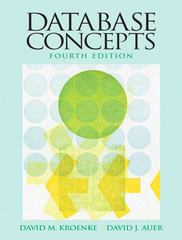Question
Instructions: For this assignment you will construct a single python file called a4.py, with several text-processing functions. You are free to use your own solutions
Instructions:
For this assignment you will construct a single python file called a4.py, with several text-processing functions. You are free to use your own solutions to these problems as building blocks for your other solutions. You may use any built-in methods you wish unless a question explicitly specifies otherwise. You may create any additional 'helper' functions you may need, however please ensure that the required functions exist, are correctly named, and well labeled. Please include the question number in the comments for each function.
You can assume that each space (' ') separates one word from the next. Note, however, that not all words are delimited by spaces on both sides. E.g. the first and last words are delimited by the start and end of file, and the last word on each line is delimited by a ' ' instead of a space. Fortunately, the default behaviour of the string.split() method is to split on ANY whitespace.
When considering unique words, you should not use case sensitivity or punctuation to distinguish words. That is, the words "Hello", "hello.", and "Hello!" should all be considered the same word (simply "hello").
Punctuation characters refers to the following set of characters: . , ? ! ; : \' \" . You may assume no other punctuation symbols exist in the provided textfiles.
A sentence is any string ending with either a '.', '?', or a '!'. You may assume that only one such character appears per sentence, and no other characters are used to terminate sentences.
Question 1:
Write a function called wordFrequency() that takes a filename(string) as an argument and returns a dictionary containing each unique word along with the number of times that word occurred in the text.
Example:
> python -i a4.py
>>> wordFrequency('phrases.txt') {'a': 16, 'stitch': 1, 'in': 5, 'time': 1, 'saves': 1, 'nine': 1, 'bite': 1, 'the': 14, 'bullet': 1, 'cry': 1, 'havoc': 1, 'and': 11, 'let': 1, 'slip': 1, 'dogs': 1, 'of': 11, 'war': 1, 'dont': 1, 'count': 1, 'your': 2, 'chickens': 1, 'before': 1, 'they': 1, 'are': 2, 'hatched': 1, 'eye': 1, 'newt': 1, 'toe': 1, 'frog': 1, 'wool': 1, 'bat': 1, 'tongue': 1, 'dog': 1, 'friends': 1, 'romans': 1, 'countrymen': 1, 'lend': 1, 'me': 1, 'ears': 1, 'give': 1, 'man': 1, 'fish': 2, 'you': 10, 'feed': 2, 'him': 3, 'for': 5, 'day': 2, 'show': 1, 'how': 2, 'to': 2, 'catch': 1, 'lifetime': 1, 'do': 2, 'make': 3, 'tissue': 1, 'dance': 1, 'put': 1, 'little': 1, 'boogie': 1, 'it': 3, 'i': 5, 'can': 3, 'run': 1, 'but': 6, 'not': 3, 'walk': 1, 'have': 4, 'mouth': 1, 'cannot': 2, 'talk': 1, 'bed': 1, 'sleep': 1, 'what': 2, 'am': 1, 'river': 1, 'jack': 1, 'all': 1, 'trades': 1, 'master': 1, 'none': 1, 'knock': 2, 'whos': 1, 'there': 1, 'etch': 2, 'who': 2, 'gesundheit': 1, 'laugh': 1, 'world': 1, 'laughs': 1, 'with': 4, 'weep': 2, 'alone': 1, 'sad': 1, 'old': 1, 'earth': 1, 'must': 1, 'borrow': 1, 'its': 2, 'mirth': 1, 'has': 1, 'trouble': 1, 'enough': 1, 'own': 1, 'everything': 1, 'as': 2, 'simple': 1, 'possible': 3, 'simpler': 1, 'no': 2, 'one': 2, 'see': 2, 'their': 1, 'reflection': 1, 'running': 1, 'water': 2, 'is': 7, 'only': 2, 'still': 1, 'that': 1, 'we': 4, 'once': 1, 'game': 1, 'over': 1, 'king': 1, 'pawn': 1, 'go': 3, 'back': 1, 'same': 2, 'box': 1, 'more': 1, 'matter': 2, 'attitude': 1, 'decision': 1, 'choose': 1, 'among': 1, 'impossible': 1, 'possibilities': 1, 'when': 2, 'sound': 1, 'opportunity': 1, 'becomes': 1, 'solution': 1, 'quid': 1, 'pro': 1, 'quo': 1, 'rain': 3, 'away': 1, 'come': 1, 'again': 1, 'another': 1, 'some': 1, 'people': 1, 'feel': 1, 'others': 1, 'just': 1, 'get': 1, 'wet': 1, 'best': 1, 'laid': 1, 'schemes': 1, 'mice': 1, 'men': 1, 'often': 1, 'awry': 1, 'leave': 1, 'us': 1, 'naught': 1, 'grief': 1, 'pain': 1, 'promised': 1, 'joy': 1, 'until': 1, 'peace': 1, 'youll': 1, 'never': 1, 'be': 1, 'content': 1, 'van': 1, 'gogh': 1, 'became': 1, 'painter': 1, 'because': 1, 'he': 1, 'had': 1, 'ear': 1, 'music': 1, 'solve': 1, 'our': 1, 'problems': 1, 'thinking': 1, 'used': 1, 'created': 1, 'them': 1, 'x': 1, 'marks': 1, 'spot': 1, 'yesterday': 1, 'canceled': 1, 'check': 1, 'tomorrow': 1, 'promissory': 1, 'note': 1, 'today': 1, 'cash': 1, 'so': 1, 'spend': 1, 'wisely': 1, 'zeal': 1, 'without': 2, 'knowledge': 1, 'fire': 1, 'light': 1} You can use the following text-file to test your answers: http://people.scs.carleton.ca/~arunka/courses/comp1005/assignments/a4/phrases.txt
Step by Step Solution
There are 3 Steps involved in it
Step: 1

Get Instant Access to Expert-Tailored Solutions
See step-by-step solutions with expert insights and AI powered tools for academic success
Step: 2

Step: 3

Ace Your Homework with AI
Get the answers you need in no time with our AI-driven, step-by-step assistance
Get Started


